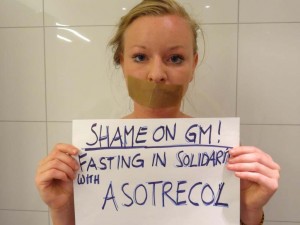The small General Motors plant in Bogota, Columbia generally isn’t regarded as critical to GM’s fortunes in Latin America.
But a long-simmering labor dispute in Bogota between GM’s local management and a handful of determined strikers is making waves and now threatens to involve workers from GM’s much more critical operations in Brazil where workers have begun calling on the automaker to respect the human rights of the Columbian workers.
“We know that not only in Brazil are we being attacked by GM’s plans. We also know that in Colombia, Mexico, France and Germany (GM wants) to end the jobs and workers’ rights,” Herbert Claros da Silva, vice president of the metalworkers union in San Jose dos Campos, said in a letter to activists from the Autoworkers Caravan.
GM workers from San Jose dos Campos recently blocked a highway to protest GM proposal to eliminate 1,800 jobs.
The dispute in Columbia began more than a year ago when dozens of workers dismissed by GM’s local management, formed the Association of Injured Workers and Ex-workers of GM Colombia or ASOTRECOL and set up an encampment August 1, 2011 outside the U.S. embassy in Bogota, choosing that location because of the 26% stake the U.S. government holds in GM.
At the heart of dispute in Colombia, which is centered around the Colmotores plant in Bogota, is the workers’ contention that employees are treated like casual laborers and dismissed if they are injured on the job. Working at breakneck speed under antiquated conditions, over 200 workers have suffered injuries and illnesses rendering them unable to work, contends Jorge Parra, a former GM worker who was deputized to make the case for the Columbian workers in the U.S. with help from U.S. trade unions and human rights activists.
On Aug. 1, 2012, the Columbian workers had begun a hunger strike to underscore their demands for recognition of their injuries as work-related as well as reintegration into the workforce for those able to get back on the job – along with pensions for those unable to work — paid health care, and recognition as an independent union inside the plant.
The hunger strike and subsequent publicity as well as a small demonstration outside GM headquarters in Detroit, has turned the obscure labor dispute into a global headache for the automaker.
In an effort to head off wider protests, GM dispatched a task force to Columbia, which included a representative from the company’s labor relations staff and the United Auto Workers, to help open a dialog between the small band of Columbian workers and the local management in Columbia where the protesting workers suspended their hunger strike.
GM even enlisted the offices of the U.S. Federal Mediation and Conciliation Service, which is tasked with finding ways to settle seemingly intractable disputes between labor and management in the U.S. The effort ended in failure and frustrated Columbian workers have sent Parra back to the U.S. to renew the plea for their case.
Parra said the offer from GM’s local management in Columbia was not even enough to cover medical bills. GM flat out refused to consider giving workers their jobs back. “The insignificant funding they offered would have accomplished nothing but convert us into street food vendors,” said Parra, who is hoping to meet with GM representatives in Detroit.
Meanwhile, activists assisting Parra are reaching out to other unions at other GM plants around the world. “The truth is that autoworkers are being pushed beyond their endurance,” noted Frank Hammer, a retired UAW staff member, who is aiding Parra in his fight.
Meanwhile, GM also is involved in an ongoing struggle with the German metalworkers union over proposed plant closing and is caught in unresolved contract disputes in South Korea and Canada.

